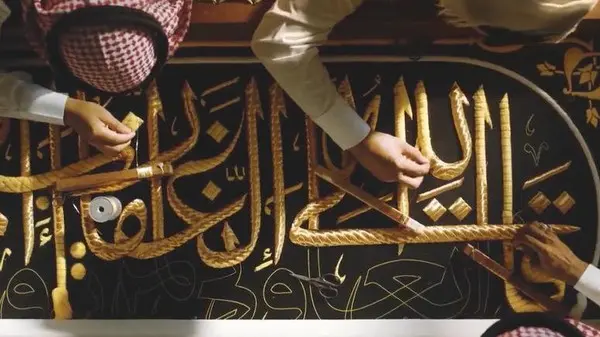Every year, the holy Kaaba, a sacred site in Islam, is covered with a new cloth called the Kiswah. This tradition takes place either on the ninth or tenth day of Dhul Hijja, the final month of the Islamic calendar. However, this year, the replacement will occur on the first day of Muharram, the first month of the Islamic calendar.
A dedicated factory called Al-Kiswah Factory, located about 10 minutes away from the Masjid Al-Haram, is responsible for manufacturing the new cover. The factory has already prepared the new Kiswah, which requires a large amount of silk, gold, and silver to make.
As part of the preparations for the Hajj pilgrimage, the lower part of the Kiswah has been raised about three meters, and the area beneath it has been covered with white cotton fabric. This is done to protect the black cloth, as some pilgrims touch it while circling the Kaaba. This procedure is repeated every year to ensure the preservation of the Kaaba’s sacred covering.
The verses and surahs written on the kiswah vary from year to year but typically include the following:
- Surah Al-Fatiha (The Opening): This is the first chapter of the Quran and is recited in every unit of the Muslim prayer.
- Ayat Al-Kursi (The Throne Verse): This verse (2:255) describes Allah’s sovereignty and is considered one of the most powerful verses in the Quran.
- Surah Al-Ikhlas (The Sincerity): This is the 112th chapter of the Quran and emphasizes the oneness and uniqueness of Allah.
- Surah Al-Falaq (The Daybreak): This is the 113th chapter of the Quran and seeks refuge from the darkness and evil of the world.
- Surah An-Nas (The Mankind): This is the 114th chapter of the Quran and seeks refuge from the whispers and temptations of Satan.
These are just a few examples of the Quranic verses and surahs that can be found on the kiswah. The specific selection may vary depending on the year and the preferences of the individuals responsible for creating it.


